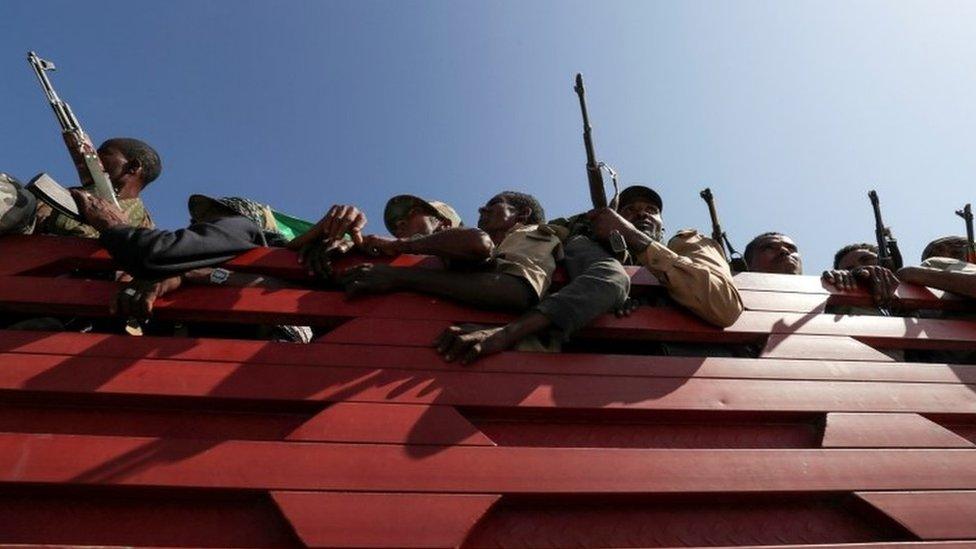Ethiopia's Tigray crisis: Debretsion Gebremichael vows to fight on
- Published
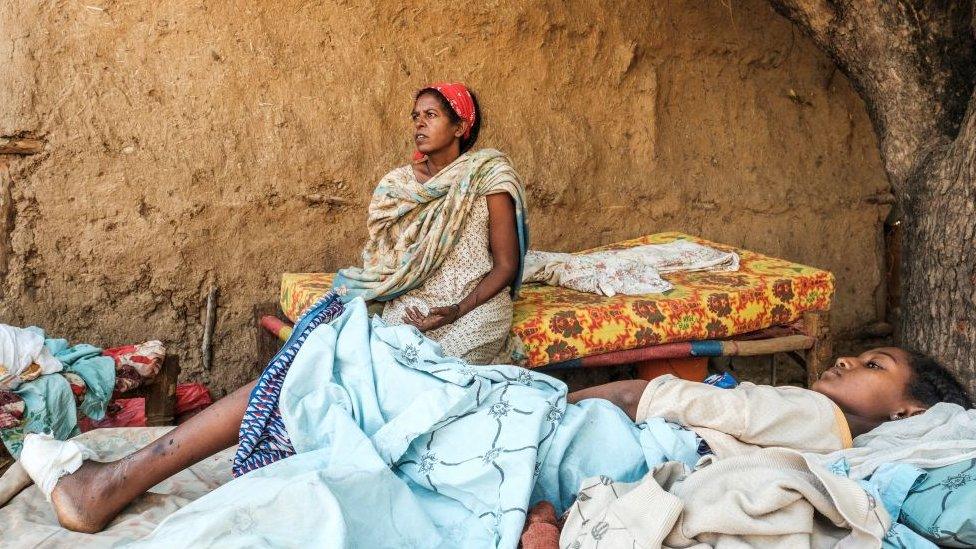
A photographer in the Tigrayan town of Humera has seen people injured in shelling that hit their compound
The leader of Ethiopia's Tigray region has rejected the prime minister's ultimatum to surrender by Wednesday and has pledged to fight on in the conflict engulfing the north of the country.
Debretsion Gebremichael denied federal government claims that the regional capital, Mekelle, was surrounded.
Hundreds have reportedly been killed and tens of thousands have fled in nearly three weeks of fighting.
The UN has warned it could trigger a humanitarian crisis.
Prime Minister Abiy Ahmed on Sunday announced a 72-hour deadline for the region's fighters to surrender, and the army warned Mekelle's 500,000 residents that soldiers would "encircle" the city and attack it.
But Mr Debretsion, who heads the Tigray People's Liberation Front (TPLF), said the prime minister "doesn't understand who we are. We are people of principle and ready to die in defence of our right to administer our region", AFP news agency quotes him as saying.
The TPLF is the dominant political party in Tigray and was once a powerful militia force that led the fight to overthrow a previous Ethiopian government in 1991.


The Tigray leader also said, according to the Reuters news agency, that government claims about Mekelle were a cover for a need to regroup after the army was defeated on three fronts.
It is very hard to verify what is happening in the region as there is a virtual communications blackout.
What else is happening?
The Ethiopian government has accused TPLF forces of destroying infrastructure including the airport in the ancient tourist town of Aksum, state-affiliated Fana news site reports.
It shared images of a ploughed runway, accusing the fighters of harming the region's economy.
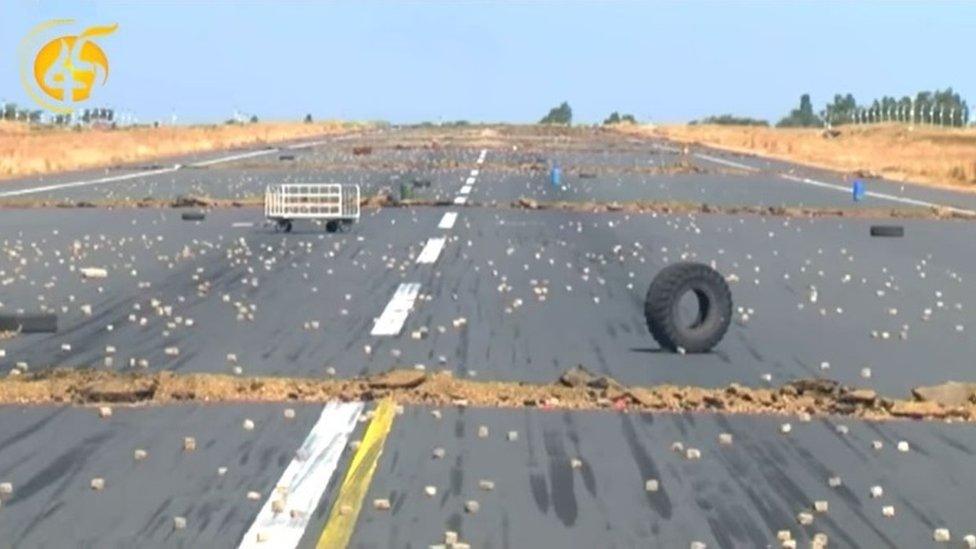
The TPLF has not commented on the accusations but Mr Debretsion told Reuters news agency on Sunday that his forces had managed to stall advancing federal troops.
"They [are] sending waves after waves but to no avail," he said.
Are there attempts to find a diplomatic solution?
The United Arab Emirates, an influential ally of the Ethiopian government, said it was concerned about the conflict and that it was making contacts around Africa and the world to try to end it.
And on Friday, South Africa's President Cyril Ramaphosa, in his capacity as the African Union chairman, announced the appointment of three former presidents to broker talks to end the conflict.
But Ethiopia has rejected the offer because it sees the operation as an internal "law enforcement" mission.
"We don't negotiate with criminals... We bring them to justice, not to the negotiating table," Mamo Mihretu, a senior aide to Mr Abiy, told the BBC.
"Our African brothers and sisters would play a more significant role if they put pressure on TPLF to surrender and for that, you know, nobody needs to go to Tigray or Mekelle to make that point clear to them."
Mr Mamo said that the government was doing its "utmost" to allow UN agencies to provide assistance to people in Tigray.
What is the fighting about?
The conflict is rooted in longstanding tension between the TPLF, the powerful regional party, and Ethiopia's central government.
When Mr Abiy postponed a national election because of coronavirus in June, tensions escalated. The TPLF sees the central government as illegitimate, arguing that Mr Abiy no longer has a mandate. It held its own election, which the government said was "illegal".
On 4 November the Ethiopian prime minister announced an operation against the TPLF, accusing its forces of attacking the army's northern command headquarters in Mekelle.
The TPLF has rejected the claims.
Its fighters, drawn mostly from a paramilitary unit and a well-drilled local militia, are thought to number about 250,000.
Three consequences of the ongoing crisis in Tigray
How bad is the situation?
Aid agencies have no access to the conflict zone, but they fear that thousands of civilians may have been killed since fighting erupted at the beginning of November.
At least 33,000 refugees have already crossed into Sudan. The UN refugee agency has said it is preparing for up to 200,000 people to arrive over the next six months if the fighting continues.
On Friday, the TPLF was accused of firing rockets into the city of Bahir Dar in the neighbouring Amhara region. The Amhara government said there were no casualties and no damage caused.
But the reported incident in Amhara, which has a long-running border dispute with Tigray, has raised concerns that the conflict could extend into a wider war after regional forces were sent to support federal troops.
Meanwhile, the UN has raised concerns about the influx of refugees into Sudan, which it says could destabilise a nation already supporting about a million people displaced from other African countries.
Many of the refugees arriving in Sudan are believed to be children. Aid agencies say an immediate ceasefire would allow them to help thousands of civilians still trapped inside Ethiopia.
'We came with the clothes on our backs'
Aid agencies are appealing for $50m (£38m) for food and shelter for the new arrivals.

Five things about Tigray:
1. The Kingdom of Aksum was centred in the region. Described as one of the greatest civilisations of the ancient world, it was once the most powerful state between the Roman and Persian empires.
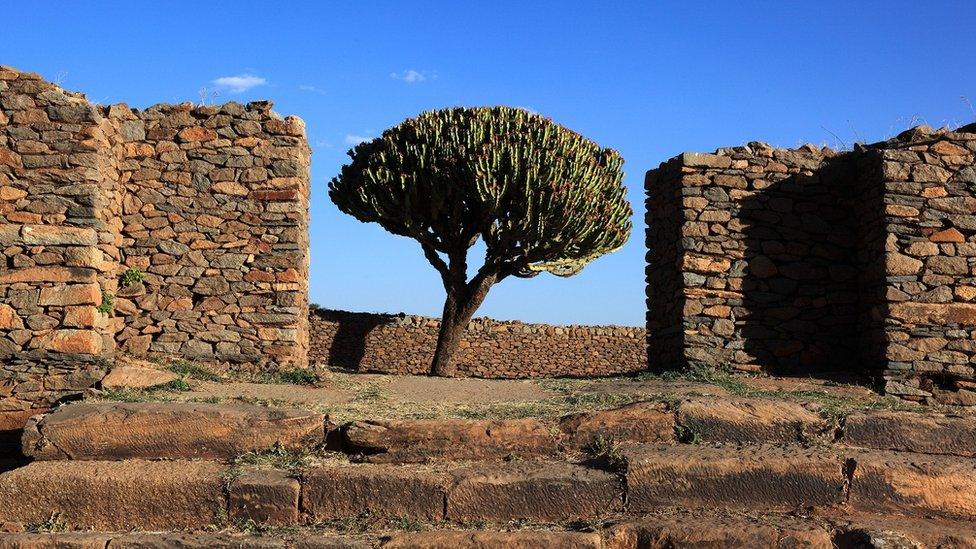
Aksum is believed to have been the home of the biblical Queen of Sheba
2. The ruins of the city of Aksum are a UN World Heritage Site. The site, dating from between the 1st and 13th Century AD, features obelisks, castles, royal tombs and a church which is believed by some to house the Ark of the Covenant.
3. Most people in Tigray are Ethiopian Orthodox Christians. The region's Christian roots stretch back 1,600 years.
Is this the home of the Ark of the Covenant?
4. The region's main language is Tigrinya, a Semitic dialect with at least seven million speakers worldwide.
5. Sesame is a major cash crop, exported to the US, China and other countries.
- Published19 November 2020
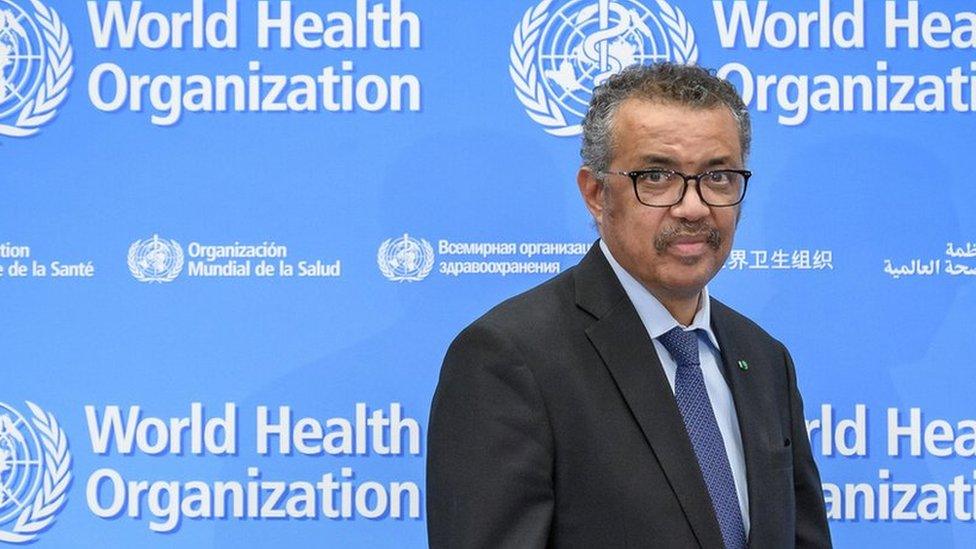
- Published13 November 2020
